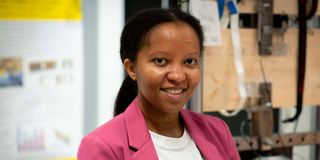Premium
The making of a timber engineer

Joan Gikonyo, PhD student in mass timber engineering at Linnaeus University in Sweden.
“If it’s going to be, it’s up to me” is a saying from engineer Joan Gikonyo’s mother, which has stayed with her from childhood to date. This reminds her that she’s responsible for her own success.
The daughter of teachers, who confesses she’s always enjoyed school, is pursuing a PhD in mass timber engineering at Linnaeus University in Sweden. Her parents taught her to define who she is so well that her confidence, passion, and conviction are palpable when you interact with her.
Your parents have been hugely influential in your life, tell us more about that
My dad, who taught chemistry, was very hands-on when it came to helping with homework, and my mum, a language teacher, instilled strong values in us. Education was a huge priority in our home.
My parents’ belief in me gave me the confidence to pursue my dreams, even when I wasn’t sure what the future held. And my parents have been my biggest supporters, and I know my brothers would say the same.
My dad once told me, ‘Never let anyone touch your ego.’ With this, he meant that there’s a part of you—your core—that no one should be able to break. These mantras from my parents have helped me navigate challenges, especially when I’ve faced bias or felt underestimated in my field. You have to define who you are, not let others do it for you.
Your career journey has taken some interesting turns. How did you end up here?
I started with a civil engineering degree at Jomo Kenyatta University of Agriculture and Technology (JKUAT) in Kenya. After working for a few years, I decided to pursue a Master’s abroad, which eventually led me to research cross-laminated timber (CLT). Along the way, I realised that no experience goes to waste. Each part of my journey, even coding, which I first learned about in high school, played a role in shaping where I am today.
Tell us more about your experience with coding
That’s a very important part of my story. I attended Bishop Gatimu Ngandu Girls High School in Karatina, Nyeri and it was there that I was introduced to coding. The administration used to bring in experts to talk to us about different career fields, and one day, they brought in professionals from the tech industry. They spoke to us about languages like Java and C++, and that sparked my interest in coding. At the time, I didn’t know much about the field, but it stayed with me. After high school, I attended a college in Kenya to learn more about coding because my curiosity was piqued. Little did I know how useful those coding lessons would be later in my career, especially during my master's and now, my PhD.
How else did your high school years influence your career path?
Aside from coding, high school was where my love for science, especially physics, was nurtured. We had passionate teachers who made science come alive for me. That’s when I knew I wanted to do something in the engineering field. The exposure to coding was just another layer. High school really shaped my interests and set me on the path to where I am today.
What obstacles have you faced, particularly as a woman in engineering?
After graduating, I worked as a structural engineer in Kenya, and I noticed that some male colleagues would be given more opportunities than women, even when we were equally qualified. This is not to say that I did not have supportive male colleagues, who’ve continued to be my biggest cheerleaders to date. For me, instead of trying to prove myself to people who didn’t value my skills, I focused on bettering myself. That’s when I decided to study abroad. Pursuing a PhD in a foreign country was daunting, and there were times, like when my supervisor left unexpectedly, that I doubted my decision. But I kept going, remembering my mum’s words: “If it’s going to be, it’s up to me.”
What advice would you give to young people, especially those considering studying abroad?
Be very clear about your reasons for studying abroad. It’s not just about the degree; it’s about personal growth and adapting to a new environment. Life abroad can be tough—you’re away from your family, navigating a new culture, and in places like Sweden, you have to deal with the weather too. I was in my late 20s when I moved abroad, and that maturity helped me handle the experience. I always advise younger people to gain some work experience first and to be mentally and emotionally prepared for the challenges. It’s important to do it for yourself, not to meet anyone else’s expectations.
What excites you most about timber engineering?
(Face lighting up) Timber engineering is exciting because it combines sustainability with innovation. My research focuses on cross-laminated timber (CLT), a renewable alternative to steel and concrete. CLT is not only strong and versatile but also environmentally friendly, which is crucial in combating climate change. It’s fulfilling to know that my work contributes to creating more sustainable construction solutions.
What’s on the horizon for you?
I’m nearing the end of my PhD, so I’m open to different paths. I love teaching, so academia is definitely an option, but I also enjoy the practical side of working in the industry. Ultimately, I’d like to return to Kenya. There’s so much potential there, especially in sustainable construction, and I want to be part of that growth.






